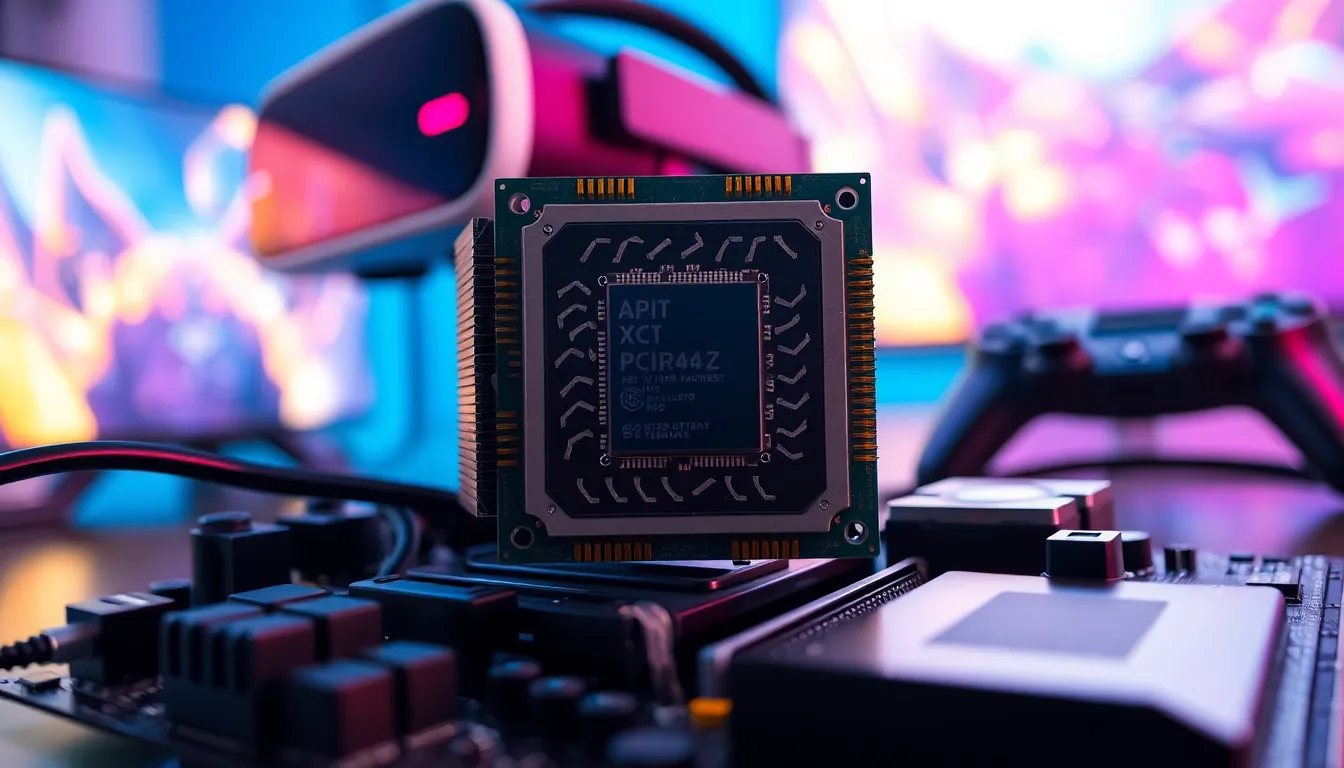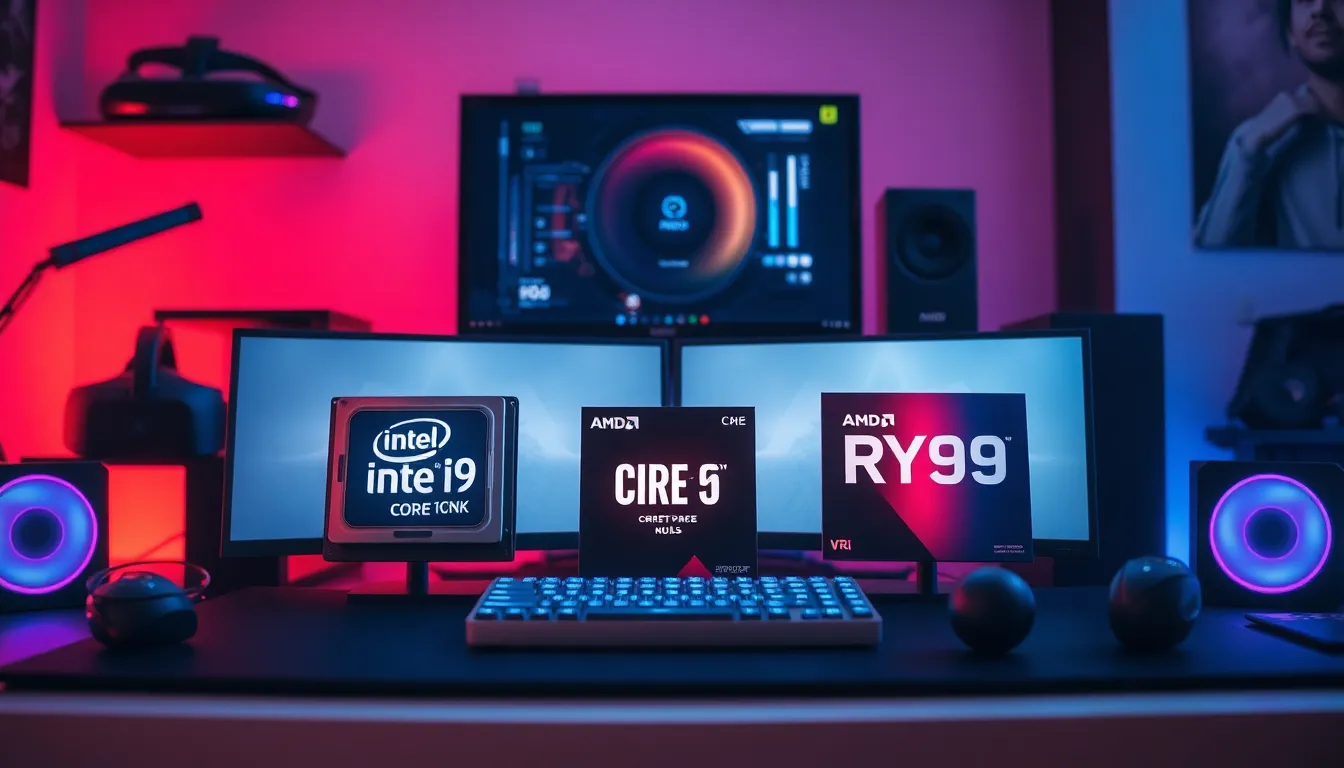Phone:
(701)814-6992
Physical address:
6296 Donnelly Plaza
Ratkeville, Bahamas.

Virtual reality gaming isn’t just a trend; it’s a whole new dimension where reality takes a backseat and immersive experiences take the wheel. But to truly escape into these digital worlds, gamers need a powerhouse CPU that can keep up with the demands of VR. After all, nobody wants their epic dragon battle to turn into a slideshow.
VR gaming demands specific hardware capabilities to deliver an immersive experience. A powerful CPU stands out as a crucial component, enabling smooth gameplay under varying conditions.
A good CPU directly influences performance in VR environments. It handles data processing for graphics, physics, and AI, ensuring minimal lag. Lag can disrupt the immersive experience, leading to discomfort. Players encounter smoother frame rates, which is vital during fast-paced gaming scenarios. High-performance CPUs also support higher resolutions, which enhances visual fidelity. Investing in a robust CPU ensures users can enjoy the latest VR titles without compromise.
Several features determine the suitability of a CPU for VR gaming. Core count plays a significant role; modern games often take advantage of multiple cores for improved multitasking. Clock speed matters, impacting how quickly the CPU processes information. Thermal performance is essential, as VR gaming pushes hardware limits, leading to increased heat generation. Compatibility with the latest technologies ensures the CPU can support advanced VR headsets and graphics cards. Effective cooling solutions may enhance performance longevity, maximizing the gaming experience.

Selecting the right CPU significantly impacts VR performance. Here are some top choices tailored for immersive gaming.
Intel Core i9-13900K stands out as a leading option. This CPU features 24 cores, with 8 performance and 16 efficiency cores. Clock speeds reach up to 5.8 GHz, ensuring swift data processing. With support for DDR5 memory, it enhances bandwidth for graphics-intensive games. Thermal performance remains optimal, allowing sustained operation during intense gaming sessions. It effectively handles demanding VR titles with minimal lag, providing a seamless experience.
AMD Ryzen 9 7950X excels in multi-threaded performance. Featuring 16 cores and a base clock of 4.5 GHz, it belongs to the Ryzen 7000 series. The boost clock can reach 5.7 GHz, accommodating high-demand scenarios. Additionally, its architecture utilizes advanced 5nm technology, promoting energy efficiency. This CPU supports up to 128GB of DDR5 RAM, benefiting complex VR environments with rich details. Enhanced thermal management keeps temperatures in check, promoting stability during lengthy gaming sessions.
Intel Core i7-12700K offers balanced performance at a competitive price. It consists of 12 cores, with 8 performance and 4 efficiency cores. Base clock speeds begin at 3.6 GHz, boosting to 5.0 GHz under load. This CPU supports both DDR4 and DDR5 memory, catering to a range of setups. Equipped with integrated graphics, it provides flexibility for non-gaming tasks. While performance holds up in VR scenarios, it remains a cost-effective choice for gamers seeking a powerful experience.
Performance metrics are crucial when selecting a CPU for VR gaming. Two primary aspects to consider are single-thread and multi-thread performance, which significantly impact the gaming experience.
Single-thread performance refers to how well a CPU handles tasks on a single core. Higher clock speeds often enhance this capability, leading to smoother gameplay. The Intel Core i9-13900K showcases impressive single-thread performance with its high clock speeds, allowing demanding VR titles to run effortlessly. Meanwhile, the AMD Ryzen 7 5800X also excels, providing adequate power for most VR applications. Gamers benefit from CPUs with higher single-thread scores, as they can manage individual game processes more efficiently, reducing lag during critical moments.
Multi-thread performance examines a CPU’s efficiency in handling multiple tasks simultaneously. A CPU with more cores effectively manages the demands of complex VR environments. For instance, the AMD Ryzen 9 7950X stands out with 16 cores, delivering exceptional multi-threaded performance ideal for intricate VR experiences. In contrast, the Intel Core i7-12700K, with its balanced core architecture, caters to gamers who prioritize versatility in performance. Multi-thread functionality allows seamless execution of background processes and the game itself, ensuring an immersive experience without interruptions.
Selecting the right CPU for VR gaming requires careful consideration of one’s budget. The price of CPUs can significantly impact overall system performance and gaming experience.
High-end CPUs like the Intel Core i9-13900K and AMD Ryzen 9 7950X deliver exceptional performance but come at a premium price. These options feature advanced architectures with high core counts, enhancing multi-threaded capabilities. Gamers seeking top-tier performance should expect to invest around $600 to $700 for these models. Such performance excels in rendering complex VR environments, ensuring an immersive experience.
Mid-range CPUs offer a balance between performance and cost. The Intel Core i7-12700K stands out in this category, providing robust single-thread and multi-thread capabilities at approximately $400. This price point delivers a solid VR experience without breaking the bank. Alternatives like the AMD Ryzen 7 5800X, priced similarly, excel in performance, making them excellent choices for gamers requiring effective processing power.
Budget-friendly CPUs cater to gamers who focus on cost without sacrificing performance. Options like the AMD Ryzen 5 5600X and Intel Core i5-12400 provide solid value, priced around $200 to $300. These models offer essential processing capabilities for enjoyable VR gaming experiences. While performance may not match higher-end counterparts, they effectively handle many modern VR titles with decent frame rates.
Choosing the right CPU for VR gaming is crucial for an immersive experience. A powerful processor ensures smooth gameplay and minimizes lag during intense moments. Gamers should consider factors like core count and clock speed when making their decision.
Investing in a high-performance CPU not only enhances visual fidelity but also supports the complex processing demands of VR environments. Whether opting for top-tier options or more budget-friendly alternatives, selecting the right CPU can significantly elevate the overall gaming experience. Prioritizing performance will allow players to fully enjoy the latest VR titles without compromise.